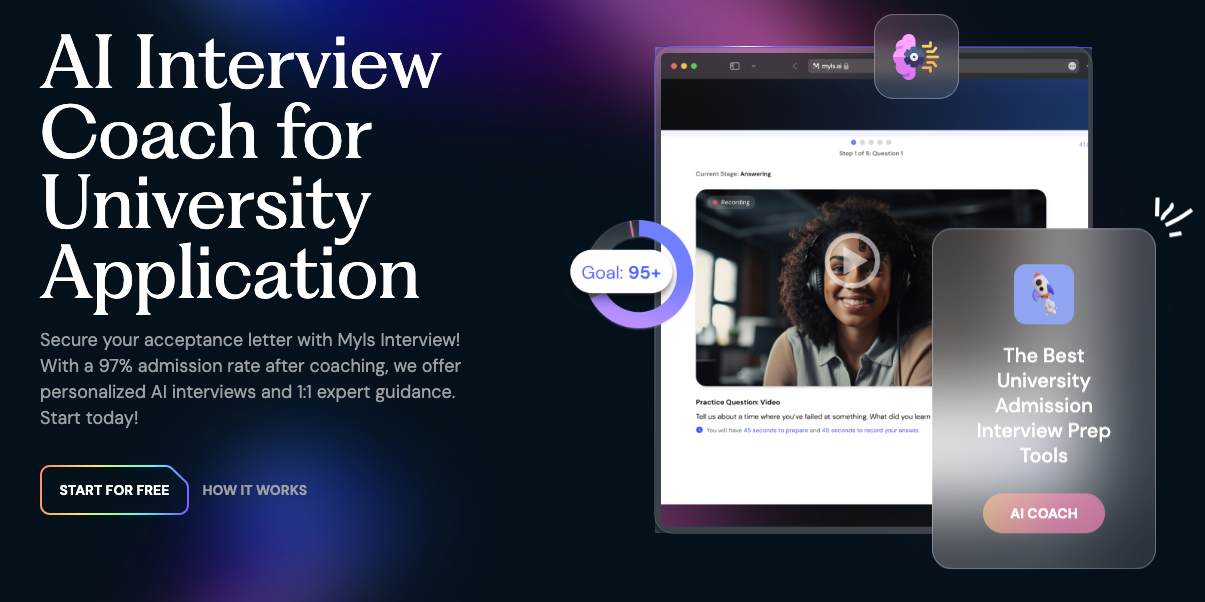How to Choose the Right University Offer: A Student’s Guide to Smart Decision-Making
With multiple university offers in hand, choosing the right one can feel overwhelming. This guide helps you weigh academics, cost, culture, and career fit—plus why working with a Myls Interview mentor can bring clarity, reduce stress, and help you make a confident, purposeful decision.

You did it. After months of studying, researching, writing, applying, and waiting, the acceptance letters are finally in.
And now comes the part no one warned you would be this hard: choosing.
Deciding between multiple university offers is both exciting and overwhelming. It can feel like every choice leads to a different version of your future — and you only get to pick one.
Do you go for the program with the highest ranking? The one that feels most comfortable? The one with the biggest scholarship or the best co-op? Or the one that no one else expected you to choose — but feels right to you?
We will help you slow down, think clearly, and make a decision based on more than just reputation or pressure. We'll also show you why working with a mentor during this phase can be the difference between choosing quickly and choosing wisely.
Why This Decision Deserves Thoughtful Planning
Choosing a university isn't just about where you’ll spend the next four years. It's about setting the direction of your academic path, professional network, personal development, and in many ways, your adult identity.
The university offer you accept can shape:
- The professors and mentors who influence your thinking
- The internship or research opportunities that open new doors
- The peers who challenge and support you
- The city or environment you learn to navigate independently
- The field or major that becomes the foundation for your career
And while it’s easy to default to what looks best on paper, your real growth depends on what fits you best in practice.
What to Consider When Choosing a University Offer
Academic Program Quality and Fit
One of the biggest mistakes students make is focusing only on university rankings instead of program-level strength. A mid-ranked school with an excellent program in your field may offer a better experience than a top-ranked university with a less defined or generalized curriculum.
Look at:
- Curriculum design
- Course flexibility
- Specialization options
- Accreditation (e.g., AACSB for business programs)
- Co-op, research, and fieldwork opportunities
Admission Path and Academic Expectations
Understand the structure of the university program you're entering:
- Are you directly admitted into your desired program, or do you have to compete for entry in second year?
- Are there grade maintenance requirements (e.g., Western Ivey AEO status)?
- What is the academic culture — intense and competitive or collaborative and student-centered?
These details affect both your stress levels and your academic trajectory.
Financial Considerations and Long-Term Value
Finances may not be the only factor — but they matter:
- Are you receiving renewable scholarships or just a one-time award?
- Will you be living on-campus, commuting, or relocating far from home?
- Is the cost of living manageable in that city?
A university that supports your success without overwhelming debt can offer far more long-term value than a flashier alternative.
Campus Life, Community, and Support
Don't underestimate the emotional and social side of fit. Will you feel motivated, connected, and supported in that environment?
Consider:
- Campus size and setting (urban, suburban, rural)
- Clubs, sports, and leadership opportunities
- Student services: mental health, academic advising, career counselling
- Diversity, inclusivity, and sense of belonging
Your success isn’t just about academic ability — it’s about having the right conditions to thrive.
Career Outcomes and Program Reputation
Ask:
- What are the employment rates for graduates of your program?
- What companies recruit from your school?
- Are there strong alumni networks or mentorship programs?
- Does the school’s brand carry weight in your desired field?
If you’re unsure of your exact path, choose a program that keeps multiple doors open.
Common Mistakes to Avoid
Letting Prestige Overpower Fit
It’s easy to feel pressure to accept the most “impressive” offer — even if something about the program or environment doesn’t sit right.
Prestige fades quickly if the program structure, learning style, or support systems aren’t aligned with your needs. Choose the experience, not just the logo.
Overvaluing Friends’ Choices
Your friends’ priorities may not be yours. Don’t pick a school just because others are going there. University is your journey — and your experience will be shaped by your own goals, not someone else’s.
Rushing the Decision
This isn’t a decision to make overnight. Take the time to research, reflect, and compare.
Read offer letters carefully. Some come with conditions — such as maintaining a minimum average or submitting updated grades. Don’t overlook the fine print.
Why You Need a Mentor During Offer Season
This is one of the most emotionally loaded academic decisions you'll ever make. You're not just picking a school. You're choosing the version of yourself you're ready to grow into.
And while your parents, friends, and teachers may offer input, a mentor provides something different: structured, unbiased, strategic support.
What mentors do that others don’t:
- Ask the right questions: A mentor won’t tell you what to do — they’ll help you clarify your own thinking. They ask, “What do you need in a learning environment?” or “How will this choice support your long-term goals?”
- See the whole picture: Parents may focus on finances. Friends may focus on social life. A mentor helps you weigh all factors — academics, career fit, wellness, and future opportunities — together.
- Guide the decision process: Choosing a university shouldn’t be a coin flip or a gut reaction. A mentor can walk you through tools like decision matrices, guided reflections, and long-term planning exercises.
- Share real-world context: Mentors have experience with specific schools, programs, or industries. They can speak to what life at that university actually looks like — beyond what brochures say.
- Support your confidence: When you’re doubting yourself or overwhelmed by options, a mentor brings calm and clarity. They help you own your choice — and feel good about it.
What students often say after working with a mentor:
“I didn’t realize I was choosing based on fear until my mentor helped me think through my long-term goals.”
“Talking it through with someone who understood the programs made me see them totally differently.”
“I felt lost. But now I feel like I chose on purpose — not just by default.”
A great mentor doesn’t give you the answer. They help you ask better questions — and trust yourself to answer them.
How Myls Interview Helps You Choose With Purpose

At Myls Interview, we support students not just in earning offers—but in making thoughtful, strategic decisions about which one to accept. Choosing a university isn’t just about rankings or prestige—it’s about fit, future goals, and who you want to become. That’s where our mentorship and structured tools come in.
With Myls Interview, you can:
Meet 1-on-1 with experienced mentors
Our mentors have supported students across top programs— Rotman Commerce, McMaster Health Sci, Ivey AEO and Waterloo Engineering. They understand what each offer represents—not just on paper, but in lived experience—and they’ll help you reflect on how each aligns with your goals.
Use structured tools to compare offers
We provide clear planning frameworks to help you compare academics, campus culture, co-op and internship opportunities, long-term pathways, and personal fit. You’ll gain clarity not just on what feels exciting now, but on what supports your future success.
Match your strengths and goals to the right environment
Our mentors helps you review your academic interests, communication style, learning preferences, and career direction to assess which program will challenge you, support you, and help you grow sustainably.
Access real-world insights from those who’ve been there
Beyond the glossy brochures, our mentors share candid insights about workload, teaching styles, student community, and mental health supports—so your decision is grounded in what real students actually experience.
Get continued support after you choose
We don’t stop once you accept an offer. Myls Interview helps you plan next steps—like first-year course selection, resume building, early summer prep, or MMI/interview readiness for advanced tracks.
We help you shift from “What if I choose wrong?” to “I chose with clarity.”
Final Thoughts: Don’t Just Choose — Choose Intentionally
This isn’t just a school choice—it’s a life-shaping decision. It’s about more than where you’ll study; it’s about where you’ll thrive, build community, and prepare for the challenges ahead.
So take a pause. Ask the deeper questions. Think about what excites you—and what sustains you.
Need help reviewing your offers? Sign up for free at Myls Interview and Connect with a Myls Interview mentor today and make your next big move with confidence, clarity, and purpose.




